Your Cart is Empty
Free Shipping for orders over $49 in Australia, $199 IN NEW ZEALAND/USA/CANADA AND $249 REST OF THE WORLD
Free Shipping for orders over $49 in Australia, $199 IN NEW ZEALAND/USA/CANADA AND $249 REST OF THE WORLD
Add description, images, menus and links to your mega menu
A column with no settings can be used as a spacer
Link to your collections, sales and even external links
Add up to five columns
Add description, images, menus and links to your mega menu
A column with no settings can be used as a spacer
Link to your collections, sales and even external links
Add up to five columns
Hungry Ghosts: their History and Origin
by Linda Heaphy March 22, 2017

Japanese hungry ghost, detail of a scroll painting c1800.
Photo credit: Wikimedia Commons
The Lord said: It is the men of sinful actions actuated by their previous misdeeds who become ghosts after death. Please listen to me, I shall tell you in detail.
- Garuda Purana, Vedas, verse 2.22.
Hungry ghosts are the demon-like creatures described in Buddhist, Taoist, Hindu, Sikh, and Jain texts as the remnants of the dead who are afflicted with insatiable desire, hunger or thirst as a result of bad deeds or evil intent carried out in their life times. Found in every part of the Far East, from the Philippines to Japan and China, Thailand, Laos, Burma, India and Pakistan, they are universally described as human-like wraiths with mummified skin, narrow withered limbs, grossly bulging stomachs, long thin necks and tiny mouths.
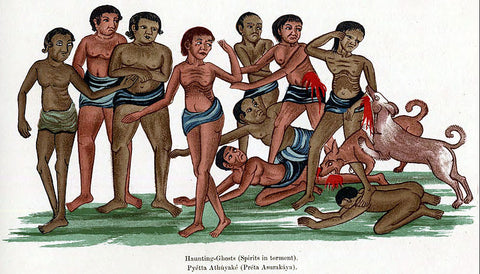
Hungry ghosts, or Pyetta, in Burmese representation, 1906.From The
Thirty Seven Nats, from Southeast Asia Digital Library by Sir Richard Carnac.
Photo credit: Wikimedia Commons
Defined by a fusion of rage and desire, tormented by unfulfilled cravings and insatiably demanding impossible satisfactions, hungry ghosts are condemned to inhabit shadowy and dismal places in the realm of the living. Their specific hunger varies according to their past karma and the sins they are atoning for. Some can eat but find it impossible to find food or drink. Others may find food and drink, but have pinhole mouths and cannot swallow. For others, food bursts into flames or rots even as they devour it. Japanese hungry ghosts called gaki must eat excrement while those called jikininki are cursed to devour human corpses. According to Hindu tradition, hungry ghosts may endlessly seek particular objects, emotions or people, those things that obsessed them or caused them to commit bad deeds when they were living: riches, gems, children, even fear or the vitality of the living.
A form of hungry ghost called the Grigori is found in Christian mythology. Mentioned in the Book of Enoch, the Grigori and their offspring, created by the union of Grigori and humans, wander the earth endlessly yearning for food though they have no mouths to eat or drink with. In China, hungry ghosts include the spirits of dead ancestors who are compelled to return to the earthly realm during the seventh month of the Chinese Lunar Calendar in August. These ghosts can eat human food, and offerings of cake, fruit and rice are commonly left out for them, while amulets are worn and incense is burnt to protect against those with evil intent or insatiable need.
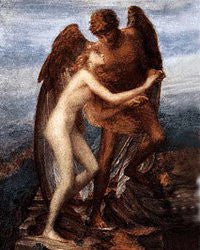
They may look like angels, but they are hungry ghosts all the same:
the Grigori described in the Book of Enoch. Photo credit: Wikimedia Commons
The desires of hungry ghosts are never satisfied and they must endlessly seek gratuity from the living. They can also cause misfortune to those whose chi energy is depleted or whose luck is bad. Some are driven seek to possess weak-willed men and women so as to dispossess their souls and take over their bodies, all the better to eat and drink with. In addition to hunger, hungry ghosts may suffer from immoderate heat and cold; the moon scorches them in summer, while the sun freezes them in winter, adding to their torment. The suffering of these creatures resembles that of the souls condemned to hell, but they are distinguishable by the fact that the damned are confined to the subterranean realm while hungry ghosts can occupy the world of the living.
In Buddhism, hungry ghosts are often seen as a metaphor for those individuals who are following a path of incorrect desire, who suffer from spiritual emptiness, who cannot see the impossibility of correcting what has already happened or who form an unnatural attachment to the past. Hungry ghosts are also sometimes used as a metaphor for drug addiction.
In the west, the time of hungry ghosts is tied subconsciously to the time of Halloween, when the spirits of loved ones may return to the realm of the living and be welcomed – or bring with them undesirable spirits replete with malicious intent. The candle placed in the jack o’ lantern or at the windowsill guides the souls of the beloved home, while the jack o lantern itself warns off the hungry ghosts.

Second section of the Hungry Ghosts Scroll, depicting the world of the hungry ghosts, one of the six realms of Buddhism, and tales of their salvation. This particular section explains how those born as hungry ghosts are saved by the offerings of the living and relates the story of one of the thirty-six types of hungry ghosts who constantly seek water to drink. The central scene of this section shows people pouring water on a funerary marker for the ullambana festival for the dead. Kyoto National Museum. Photo credit: Wikimedia Commons
Tirokudda Kanda: Hungry Shades Outside the Walls
(Petavatthu Verse 1.5, translated by Thanissaro Bhikkhu, 2010)
Outside the walls they stand,
& at crossroads.
At door posts they stand,
returning to their old homes.
But when a meal with plentiful food
& drink is served,
no one remembers them:
Such is the kamma of living beings.
Thus those who feel sympathy for their dead relatives
give timely donations of proper food
& drink — exquisite, clean — [thinking:]
"May this be for our relatives. May our relatives be happy!"
And those who have gathered there,
the assembled shades of the relatives,
with appreciation give their blessing
for the plentiful food & drink:
"May our relatives live long
because of whom we have gained [this gift].
We have been honored,
and the donors are not without reward!"
For there [in their realm]
there's no farming, no herding of cattle,
no commerce, no trading with money.
They live on what is given here,
hungry shades whose time here is done.
As water raining on a hill flows down to the valley,
even so does what is given here benefit the dead.
As rivers full of water fill the ocean full,
even so does what is given here benefit the dead.
"He gave to me, she acted on my behalf,
they were my relatives, companions, friends":
Offerings should be given for the dead
when one reflects thus on things done in the past.
For no weeping, no sorrowing no other lamentation
benefits the dead whose relatives persist in that way.
But when this offering is given,
well-placed in the Sangha,
it works for their long-term benefit and they profit immediately.
In this way the proper duty
to relatives has been shown,
great honor has been done to the dead,
and monks have been given strength:
The merit you've acquired isn't small.
___________________________________________________________
Excerpt from the Garuda Purana (Vedas), explaining the origin of one hungry ghost:
translation J.L. Shastri, Verse 2.7.53 - 2.7.61, from VEDA -Vedas and Vedic Knowledge Online
Once an aged woman of the brahmana caste went to the holy place Bhadravrata. The old woman lived with her son aged five years.
I being a ksatriya pretender stopped her in the wilderness, became a wayside robber and took her viaticum with clothes along with the dress of her son. I wrapped them around my head and wanted to leave. I saw the little boy drinking water from a jar. In that wilderness, only that much water was there.
I frightened the boy from drinking water and being thirsty myself began to drink from the jar. The boy died of thirst and the mother who was struck with grief died too, by throwing herself into a dry well.
O brahmana, by that sin I became a ghost with mouth as small as the hole of a needle and body as huge as a mountain.
Although I get food I cannot eat.
Although I burn with hunger my mouth is contracted.
Since in my mouth I have a hole equal to that of a needle I am known as Sucimukha.'
References and Further Reading:
Banish hungry ghosts from your home. The Philippine Star, 9 July 2011. Retrieved 25 October 2011Fundamentals of Buddhism: Rebirth. Buddhanet. Retrieved 26 October 2011
Garuda Purana.Translated by J.L. Shastri. Ancient Indian Tradition and Mythology 12-14, Motilal Banarsidass, Delhi 1982. VEDA -Vedas and Vedic Knowledge Online
Hungry Ghost. Wikipedia. Retrieved 25 October 2011
Hungry Ghost Festival. Cultural China. Retrieved 26 October 2011
Preta. Wikipendia. Retrieved 25 October 2011
Tirokudda Kanda: Hungry Shades Outside the Walls (Pv 1.5), translated from the Pali by Thanissaro Bhikkhu. Access to Insight, 8 August 2010.Retrieved on 24 October 2011.
Ullambana (Ancestor Day) in Indian tradition. Ancient Worlds. 5 August 2008. Accessed 24 October 2011
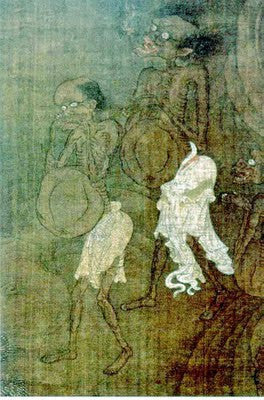
Hungry ghosts, details of a Japanese scroll painting, c1780.
Photo credit: Wikimedia Commons
Visit the Kashgar Store Online
11 Responses
Anonymous
August 09, 2023
I can feel a sense of things never being enough, the more and more money I earn never fills the spot once I obtain what I want it feels like it didn’t happen and I’m constantly searching for more.
What advice can you give me to help drop these cravings?
I want to be not money-driven and find my purpose in life which will allow me to calm my hunger feeling.
I cant help but relate to the Hungry Ghost.
Nana
June 28, 2022
Love this page and Steven’s comment
Gordeen Donovan
June 28, 2022
In my experience as a healer we all have hungry ghosts and as Rollo May wrote years ago, in his book called Love and Will, the Demonic energies that we project onto others, as well as our angelic energies, become demonic because we disconnect from these energies.
We would not have Hollywood if we stopped projecting our Star energy onto packaged images. It is hard work to do this, sounds simple and is not. We must find the ghosts, the addicts (very much the hungry ghosts) the positive and the negative within ourselves, reclaim our soul pieces, etc., to heal ourselves and ultimately to live cleanly without projecting all our undesirable aspects onto those others who are like magnets because they may, in their weakened form have more of that particular energy than we do.
Singingway
May 15, 2020
“Greed like theirs can never be filled” is now being said of the governments insisting on “getting people back to work” and “opening the country” during a pandemic, despite the fact that of the three criteria for opening, 1. Two weeks of steady decline in cases 2. Availability of Personal Protective Equipment 3. Availability of Testing — NONE of those criteria have been fulfilled. Our democracies are dysfunctional because plutocrats control them. And their greed is insatiable. They are infected with Hungry Ghost syndrome. They hate giving people unemployment (which we paid into, it’s our own money) they call “getting something for nothing” in order to shame us and bully us into risking our lives to return to work before it is safe. They are terrified we might enjoy being off their hamster wheel of working three jobs to barely survive, and might see universal basic income as a good idea. As true freedom, in fact. Greed begets more greed. Our system is set up to reward those who operate on greed. The indigenous peoples of the Earth have been warning us for centuries, that our way of life will consume itself. Now we face extinction from climate change — the pandemic is just one of the shocks to come — and the hungry ghosts still insist on “getting theirs” — arranging our governmental and economic systems so their fossil fuel wealth can continue pouring in.
Bob Elsey
December 20, 2019
Spot on as is your piece focuses on the practical aspect of this narcissism and its consequences for all of us. Namaste
sulema Rodriguez
December 20, 2019
I have been seeing a demon-like a figure with a long tongue around the house. linky arms and legs. what would it be?
Stephen Shenfield
July 22, 2019
Tibetan Buddhism recognizes five types of sentient beings — human beings, animals, gods, demons, and hungry ghosts.
Richard Raymond
November 03, 2018
https://www.amazon.com/Realm-Hungry-Ghosts-Encounters-Addiction-dp-155643880X/dp/155643880X/ref=mt_paperback?_encoding=UTF8&me=&qid=
Steve
November 03, 2018
Check out Dr. Gabor Mate
https://en.m.wikipedia.org/wiki/Gabor_Maté_(physician)
In the Realm of Hungry Ghosts: Close Encounters with Addiction, Toronto, Ontario, Canada, A.A. Knopf Canada, 2008.
Lindsey Rainwater
September 05, 2018
Thank you for this article. It was a good read and SUPER educational. I knew something of “hungry ghosts” and am researching further due to something disturbing my young son said he saw. But I didn’t know about the reference in the book of Enoch, which is one of my next areas of study. So thank you! :)
Leave a comment
Comments will be approved before showing up.
Also in Tribal Culture

Yao Heavens
by Linda Heaphy May 10, 2017
Animism Beliefs And Customs History Religion Shamanism Southeast Asia Spirituality Thailand Tribal Customs Yao
Read More Articles
About the Author
- Linda has a Honours degree in Marine Biology and a PhD in Ecology from the University of NSW, Australia. She has travelled extensively and is a passionate writer on subjects as diverse as the role played by women throughout history, tribal communities and their customs, symbology and ethnology, talismans and their history. Occasionally she also writes about her travel experiences, her new life on a 25 acres in the Northern Rivers region of northern Australia and her black miniature poodle Phoenix. She is currently writing her first book on talismans.
About Us
-
The Kashgar Philosophy

Kashgar began through a love of travel.
In 1989 my father Bernard packed in his house painting business and set off for two years on a backpacking trek to the remotest corners of the world. When he finally arrived in the oasis city of Kashgar, China, he was so impressed with its history that he decided to start a new life collecting and selling exotic goods from all over the world. For 2000 years the legendary city of Kashgar was a melting pot of ideas and a key trading post on the historic Silk Road. It was this unique combination of philosophy and trade that my father wanted to recreate at home.
Starting in markets in 1991, he opened his first store in the Sydney suburb of Newtown in 1994. I gave up my own career as a government scientist to join him in 2000 and soon convinced my partner Ian to join us in what was to become the Family Business.
Today our version of Kashgar stocks a hugely diverse range of furniture, rugs, textiles, antiques, handicrafts and jewellery sourced from over twenty different countries including India, Nepal, Tibet, China, Thailand, Burma, Laos, the Philippines, Vietnam, Mexico, Peru, Turkey, Palestine, Syria, Afghanistan and Turkmenistan. Our collection includes contemporary and tribal silver and gold jewellery, a unique range of headhunting curios, antique Buddhist relics and a collection of one-off necklaces, earrings and bracelets that I design and create myself using the beads and jewellery making techniques of ethnic minorities from around the globe.
Kashgar is a philosophy as well as a store. We are committed to supporting traditional artisans and small village communities by selling authentic handcrafted goods which are personally collected by us. By supporting traditional methods of design and production we hope to encourage local cottage industries which have a low impact on the environment and help ethnic minorities maintain their self-sufficiency into the 21st Century. We are particularly committed to assisting women around the world and to this end have worked with several organisations including the Hua Bin Women's Union of Vietnam, the East Timorese Women's Association and Tikondane in Zambia. Time honoured means of craftsmanship and traditional ways of life are disappearing as people all over the world give up their identity in favour of jeans and T-shirts. We see our trade as a means of staving off the inevitable encroachment of the 21st century, assisting communities to decide for themselves which parts of the western world they wish to incorporate (medicine, education) and which they wish to reject (prostitution, drug production, begging and servitude to warlords). We encourage our customers to think of the handicrafts and artifacts they buy from us as an investment: a piece of history and a way of life that may soon be gone forever.
Kashgar has recently closed its retail outlet and gone completely online.
In the past our pieces appeared in many movies including The Hobbit, Mission Impossible 2, Queen of the Damned, Scooby Doo, Moulin Rouge and Wolverine, and in many televisions series, as well as in plays, commercials and exhibitions. We've found special pieces for individual customers as well as for film sets, event management companies, hotels, businesses, consulates and embassies. The uniqueness of our stock means that we are also very appealing to interior and fashion designers with a taste for the exotic.
There is something for everyone at Kashgar - collectors, the curious, those looking for a special present or for something unique to adorn the home. Most of our items are one-off specialties; other pieces we only stock in small quantities so as to continuously offer a wide and ever-changing range of interesting products. We are also packed with ideas for decorating home and work premises that will challenge your established concepts of design and storage.
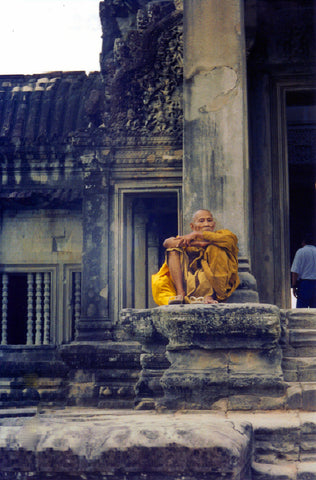
Please enjoy - Linda Heaphy
Become a Kashgar nomad and join our mailing list...
Sign up to get the latest on sales, new releases and more …

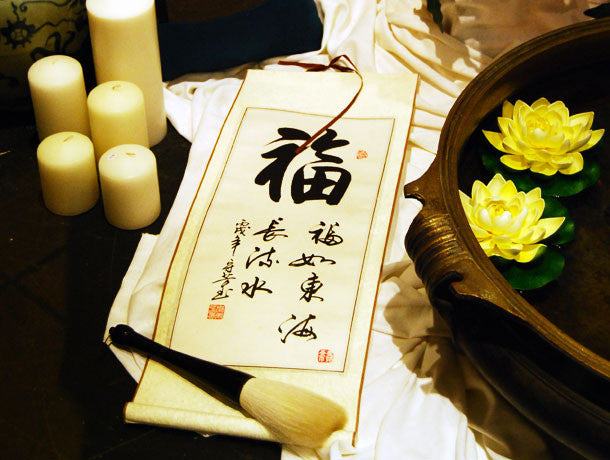




James McKenna
May 30, 2023
♥️♥️♥️♥️♥️ Thank you for this piece! A great read!